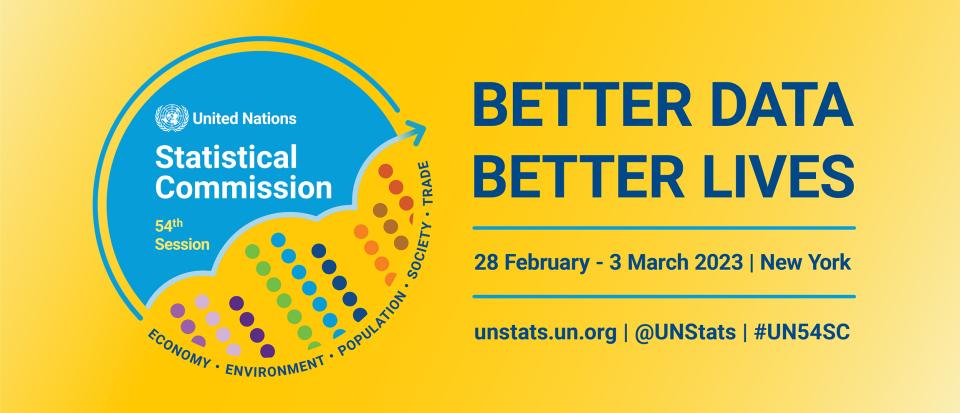SEEA Highlights of the 54th UN Statistical Commission

After two years of meeting virtually, the United Nations Statistical Commission (UNSC) met for their 54th at UN Headquarters in New York from 28 February to 3 March 2023. Each year, the United Nations Committee of Experts on Environmental-Economic Accounting (UNCEEA) presents their accomplishments and work programme to Chief Statisticians from Member States from around the world.
The Commission showed strong support for the UNCEEA’s accomplishments and programme of work. In particular, delegates welcomed the adoption of the Kunming-Montreal Global Biodiversity Framework (GBF) and its monitoring framework, and further welcomed the acknowledgement by the Conference of Parties to the Convention on Biological Diversity (CBD) on the value of aligning national monitoring with the SEEA. The role of official statistics in the GBF was also the focus on an in-person side event, co-organized by the UN Statistics Division and CBD Secretariat. During the side event, the CBD Secretariat provided an overview of the GBF, and the UN Statistics Division presented on why the SEEA has been used as the methodological basis for multiple headline indicators. In addition, Mexico and Colombia participated in a panel discussion which focused on how SEEA implementation can contribute to the GBF, beyond the provision of a statistical framework, through inter-institutional collaboration. UNDP also participated in the panel discussion, highlighting how Global Environment Facility programmes are integrating natural capital accounting.
Another highlight was the UNSC’s commendation on the establishment of the new Group of 20 Data Gaps Initiative (DGI) and the use of the SEEA to close climate change data gaps. The new DGI has 14 recommendations for closing the data gaps of G20 countries, half of which focus on climate change. The SEEA, in particular energy and air emission accounts, are used as the methodological basis for many of the climate change indicators. The global reporting templates adopted by the Committee for physical energy flow and air emission accounts will be used for the DGI. While the DGI is a G20 initiative, it is expected to have considerable spillover effects.
The UNSC also recognized the Committee’s continued work in the System of National Accounts (SNA) update process and the updates of the International Standard Industry Classification (ISIC), Central Product Classification (CPC) and Standard International Energy Product Classification (SEIC). The work of the Committee on the SNA update has focused on ensuring that the updated SNA can remain harmonized with the SEEA. Likewise, the Committee has worked on the classification updates to ensure that they are fit-for-purpose for SEEA compilers.
The UNSC also supported the progress made in advancing SEEA implementation and methodology, particularly for the SEEA Ecosystem Accounting research agenda and the forest ecosystem and ocean accounts groups. Similarly, the UNSC welcomed the progress of the Committee in building greater linkages between the SEEA and business accounting standards and frameworks on the environment and ecosystems. Finally, many countries mentioned measuring the sustainability of tourism, and the UNSC encouraged the finalization Statistical Framework for Measuring the Sustainability of Tourism (SF-MST), which will be reviewed by the UNCEEA prior to its submission to the UNWTO Committee on Statistics and UNSC.
For more on the above areas of work and other key components of the UNCEEA’s work programme, such as capacity building and business accounting, please see the report of the Committee to the UNSC: https://digitallibrary.un.org/record/4000151?ln=en. The draft decisions of the Commission will be made available soon on the UNSC website.
In addition, information on other SEEA-relevant side events that took place as part of the 54th Session can be found here:
- 3 February (virtual): Quarterly Greenhouse Gas Emission Estimates
- 16 February (recording available): New Developments in International Statistical Classifications
- 27 February (recording available): High-level Forum on Official Statistics: Statistical Measures Beyond GDP .
